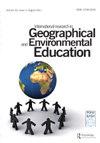GeoCapabilities 3—knowledge and values in education for the Anthropocene
IF 3.1
Q2 EDUCATION & EDUCATIONAL RESEARCH
International Research in Geographical and Environmental Education
Pub Date : 2022-10-14
DOI:10.1080/10382046.2022.2133353
引用次数: 4
Abstract
Abstract The GeoCapabilities project asks how powerful geographical knowledge can be brought into a curriculum to enhance students’ capabilities to be free to make choices for a life they value. This paper reports on the GeoCapabilities phase 3 project which explored the social justice dimension of GeoCapabilities by working with teachers and students in challenging schools. The capabilities lens, made practical through tools for curriculum making and evaluation, shows how geographical knowledge (of migration in this case) can enhance a person’s capabilities to make real choices about how to live. It also shows that the affective dimension is strongly connected to geographical knowledge including feelings, moral standpoints and values. The inequalities, injustices, fears and hopes raised when students engage with migration geography, open a space for thinking about problems, causes and alternative futures, inviting a critical lens to how political economy shapes the world. The literature and the project of GeoCapabilities have focussed on powerful disciplinary knowledge. Whilst geographical knowledge is a crucial component, I argue that an exclusive attention to disciplinary knowledge may be misleading and the concept of geographical capabilities should broaden to attend to how knowledge across disciplines, feelings, attitudes and values operate together for futures-oriented capabilities.GeoCapabilities 3——人类世教育中的知识和价值观
摘要GeoCapabilities项目询问如何将强大的地理知识纳入课程,以提高学生自由选择自己珍视的生活的能力。本文报道了GeoCapabilities第三阶段项目,该项目通过与具有挑战性的学校的教师和学生合作,探索了GeoCapability的社会正义维度。能力镜头通过课程制定和评估工具变得实用,它展示了地理知识(在这种情况下是移民)如何增强一个人对如何生活做出真正选择的能力。情感维度与地理知识密切相关,包括情感、道德立场和价值观。当学生们参与移民地理时,不平等、不公正、恐惧和希望增加了,为思考问题、原因和替代未来开辟了空间,为政治经济如何塑造世界提供了一个关键的视角。GeoCapabilities的文献和项目都集中在强大的学科知识上。虽然地理知识是一个至关重要的组成部分,但我认为,仅仅关注学科知识可能会产生误导,地理能力的概念应该扩大,以关注跨学科、情感、态度和价值观的知识如何共同作用,从而实现面向未来的能力。
本文章由计算机程序翻译,如有差异,请以英文原文为准。
求助全文
约1分钟内获得全文
求助全文
来源期刊

International Research in Geographical and Environmental Education
EDUCATION & EDUCATIONAL RESEARCH-
CiteScore
5.20
自引率
33.30%
发文量
11
期刊介绍:
International Research in Geographical & Environmental Education publishes quality research studies within the context of geographical and environmental education. The journal endeavours to promote international interest and dissemination of research in the field, provides a forum for critique, and demonstrates the relevance of research studies to good professional practice.
 求助内容:
求助内容: 应助结果提醒方式:
应助结果提醒方式:


